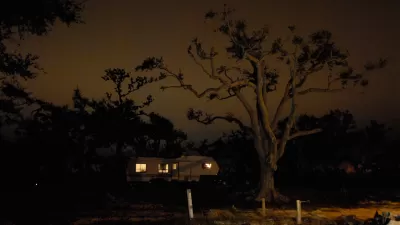On this week's KunstlerCast (James Howard Kunstler's podcast, with host Duncan Crary), you can hear me leaving a comment. I just listened to the episode, and I sound like I took a shot of codeine cough syrup before recording it. I think the point is relevant enough to reiterate in the safety of print.
On this week's KunstlerCast (James Howard Kunstler's podcast, with host Duncan Crary), you can hear me leaving a comment. I just listened to the episode, and I sound like I took a shot of codeine cough syrup before recording it. I think the point is relevant enough to reiterate in the safety of print.
In an earlier KunstlerCast, Jim was explaining the history of Seaside, FL, having just returned from accepting the Seaside Prize. Duncan expressed some skepticism about New Urbanism, saying that a "new urban" development had gone up near him, and in his book, had failed to be good urban planning. Clearly this project had flipped a switch in Duncan's head: New Urbanism is a bad thing.
Duncan's experience is common- New Urbanism has faced a backlash over recent years. The problem with this argument is that New Urbanism isn't the physical development in Duncan's neighborhood, or Seaside for that matter- it's a concept, a set of principles and guidelines, laid out very carefully in the Charter of the New Urbanism by a group of very smart architects and urbanists. The Charter is a manifesto, a call to arms:
We stand for the restoration of existing urban centers and towns within
coherent metropolitan regions, the reconfiguration of sprawling suburbs
into communities of real neighborhoods and diverse districts, the
conservation of natural environments, and the preservation of our built
legacy.
Sound good? How about this:
We advocate the restructuring of public policy and development
practices to support the following principles: neighborhoods should be
diverse in use and population; communities should be designed for the
pedestrian and transit as well as the car; cities and towns should be
shaped by physically defined and universally accessible public spaces
and community institutions; urban places should be framed by
architecture and landscape design that celebrate local history,
climate, ecology, and building practice.
So first of all, how many readers out there thought that New Urbanism = fancy molding and front porches? The New Urbanism is far more than that. The Charter is a Declaration of Independence, announcing a bold change in thinking back in 1996 for how neighborhoods, districts, and cities should be planned and built.
 In the KunstlerCast episode (#51), Jim compares new development to an omelette. His point was that newer built environments need time to 'cook' before they become accepted into their surroundings. But to extend the analogy, New Urbanism is like a fine recipe. Developed by the top chefs, the recipe is written to produce the most delicious omelette you've ever tasted. Cities, developers, and well-minded folks take the recipe and substitute ingredients, replacing the organic filet mignon the recipe calls for with ground round. Then they start changing the recipe to conform more to previous recipes that they cooked before and worked for them in the past. Then a bunch of other people come into the kitchen and start throwing in their own ingredients and partial recipes. Is it any surprise you end up with a crappy omelette?
In the KunstlerCast episode (#51), Jim compares new development to an omelette. His point was that newer built environments need time to 'cook' before they become accepted into their surroundings. But to extend the analogy, New Urbanism is like a fine recipe. Developed by the top chefs, the recipe is written to produce the most delicious omelette you've ever tasted. Cities, developers, and well-minded folks take the recipe and substitute ingredients, replacing the organic filet mignon the recipe calls for with ground round. Then they start changing the recipe to conform more to previous recipes that they cooked before and worked for them in the past. Then a bunch of other people come into the kitchen and start throwing in their own ingredients and partial recipes. Is it any surprise you end up with a crappy omelette?
You see my point. Discussions of New Urbanism need to separate the concept from the execution. Granted, the whole point is to get good things built, so if the recipe is so open to interpretation that you're getting crappy omelettes everywhere, there's a problem. But I guess if you extend my analogy, what you really need are more good chefs who understand how to bring the recipe to life.

Alabama: Trump Terminates Settlements for Black Communities Harmed By Raw Sewage
Trump deemed the landmark civil rights agreement “illegal DEI and environmental justice policy.”

Study: Maui’s Plan to Convert Vacation Rentals to Long-Term Housing Could Cause Nearly $1 Billion Economic Loss
The plan would reduce visitor accommodation by 25% resulting in 1,900 jobs lost.

Planetizen Federal Action Tracker
A weekly monitor of how Trump’s orders and actions are impacting planners and planning in America.

Wind Energy on the Rise Despite Federal Policy Reversal
The Trump administration is revoking federal support for renewable energy, but demand for new projects continues unabated.

Passengers Flock to Caltrain After Electrification
The new electric trains are running faster and more reliably, leading to strong ridership growth on the Bay Area rail system.

Texas Churches Rally Behind ‘Yes in God’s Back Yard’ Legislation
Religious leaders want the state to reduce zoning regulations to streamline leasing church-owned land to housing developers.
Urban Design for Planners 1: Software Tools
This six-course series explores essential urban design concepts using open source software and equips planners with the tools they need to participate fully in the urban design process.
Planning for Universal Design
Learn the tools for implementing Universal Design in planning regulations.
Caltrans
Smith Gee Studio
Institute for Housing and Urban Development Studies (IHS)
City of Grandview
Harvard GSD Executive Education
Toledo-Lucas County Plan Commissions
Salt Lake City
NYU Wagner Graduate School of Public Service




























